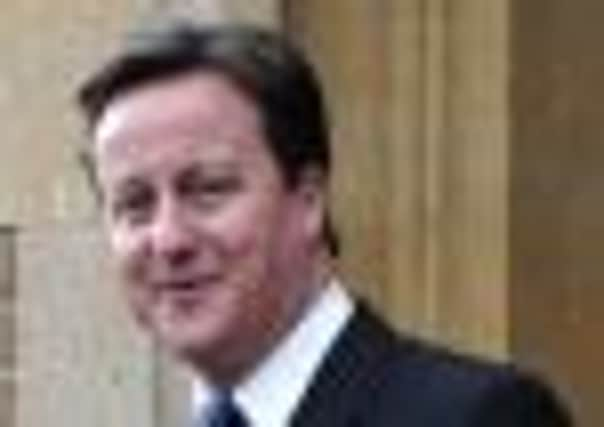No further tax powers for Scotland, says David Cameron


In a blunt message to Scottish politicians and voters, sources close to Prime Minister David Cameron say an increase in powers – such as devo-max – is “inconsistent” with staying in the UK and that they must back independence if they want full financial separation from Westminster.
The sources said a unified tax and benefits system across the UK, was at the “heart” of a single country, and could not be devolved to Scotland.
Advertisement
Hide AdAdvertisement
Hide AdThe warning – which appears to rule out both devo-max and other forms of fiscal autonomy – represents a high-stakes gamble for Cameron, with polls suggesting voters in Scotland support an option to give Holyrood more powers.
Civic groups will launch a fresh campaign tomorrow demanding a full debate on the options available to voters, arguing that the current choice between independence and the status quo is too narrow. Support is growing for the short-of-independence devo-max option, under which the Scottish Parliament would take responsibility for all taxes and pay the UK for defence and foreign affairs.
Cameron believes the SNP government should stick to its election commitment to hold a referendum on independence, and leave any debate about the future of devolution until afterwards. But in his consultation paper launched last week, First Minister Alex Salmond kept open the option of including a second question on devo-max on a preferred referendum date in 2014.
However, a senior UK government source said: “There are certain levels of autonomy that are inconsistent with the UK. A unified tax and benefit system is at the heart of a united country. If you start dismantling the tax and benefit system then that is inconsistent with a single country.
“Nobody is pretending that we can make people stay in the Union. If it is more important to people that they have a certain level of autonomy on certain issues, rather than having the economic security that the UK brings to Scotland, then there’s little you can say.”
Last week, Salmond said he wanted to ask a single question on independence but left open the prospect he might support a second question on devo-max if enough people were shown to want such an option during the consultation. Pro-Union critics, however, argue that the SNP is aiming to secure itself a safety-net that will strengthen its powers if independence is rejected at the ballot box.
Tomorrow, a new campaign led by the Scottish Council of Voluntary Organisations and the Scottish Trades’ Union Congress (STUC) will call for a wider public debate about the choice being put before voters, saying the current yes-no option is blocking discussion on further possible reform. The campaign also includes the National Union of Students, the Institute of Directors, and think-tanks Reform Scotland, and the Scottish Centre for Public Policy.
On Wednesday, the STUC is also expected to back formal plans to examine whether a “third option” can be put to voters.
Advertisement
Hide AdAdvertisement
Hide AdOn the UK warning, a spokesman for Bruce Crawford, the SNP minister for government strategy, said: “We believe independence is the best future for Scotland, but we support the right of people to advance the case for a ‘devo-max’ option in the referendum consultation.”
Meanwhile, a new poll suggests only a third of people in Scotland think independence will make them better off, but a narrow majority still want either full financial autonomy or separation from the UK.
In the YouGov survey, only 29 per cent replied that Scotland would be wealthier. The findings come with SNP strategists acknowledging the economy will be the key battleground in persuading swing voters to back independence, following polls which suggest people would support secession if it was guaranteed to make them £500 a year better off.
The current Scotland Bill will devolve £12 billion of tax and borrowing powers and allow Holyrood control of a third of its budget.